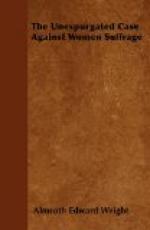With this I have, I will not say completed the tale of the suffragist’s grievances—that would be impossible—but I have at any rate dealt with those which she has most acrimoniously insisted upon.
III
ARGUMENTS WHICH TAKE THE FORM OF “COUNSELS OF PERFECTION” ADDRESSED TO MAN
Argument that Woman Requires a Vote for her Protection—Argument that Woman ought to be Invested with the Responsibilities of Voting in Order that She May Attain Her Full Intellectual Stature.
There, however, remains still a further class of arguments. I have in view here arguments which have nothing to do with elementary natural rights, nor yet with wounded amour propre. They concern ethics, and sympathy, and charitable feelings.
The suffragist here gives to man “counsels of perfection.”
It will be enough to consider here two of these:—the first, the argument that woman, being the weaker vessel, needs, more than man, the suffrage for her protection; the second, that woman, being less than man in relation to public life, ought to be given the vote for instructional purposes.
The first of these appeals will, for instance, take the following form:—“Consider the poor sweated East End woman worker. She knows best where the shoe pinches. You men can’t know. Give her a vote; and you shall see that she will very soon better her condition.”
When I hear that argument I consider:—We will suppose that woman was ill. Should we go to her and say: “You know best, know better than any man, what is wrong with you. Here are all the medicines and remedies. Make your own selection, for that will assuredly provide what will be the most likely to help.”
If this would be both futile and inhuman, much more would it be so to seek out this woman who is sick in fortune and say to her, “Go and vote for the parliamentary candidate who will be likely to influence the trend of legislation in a direction which will help.”
What would really help the sweated woman labourer would, of course, be to have the best intellect brought to bear, not specially upon the problem of indigent woman, but upon the whole social problem.
But the aspect of the question which is, from our present point of view, the fundamentally important one is the following: Granting that the extension of the suffrage to woman would enable her, as the suffragist contends, to bring pressure upon her parliamentary representative, man, while anxious to do his very best for woman, might very reasonably refuse to go about it in this particular way.
If a man has a wife whom he desires to treat indulgently, he does not necessarily open a joint account with her at his bankers.
If he wants to contribute to a charity he does not give to the managers of that charity a power of attorney over his property.




